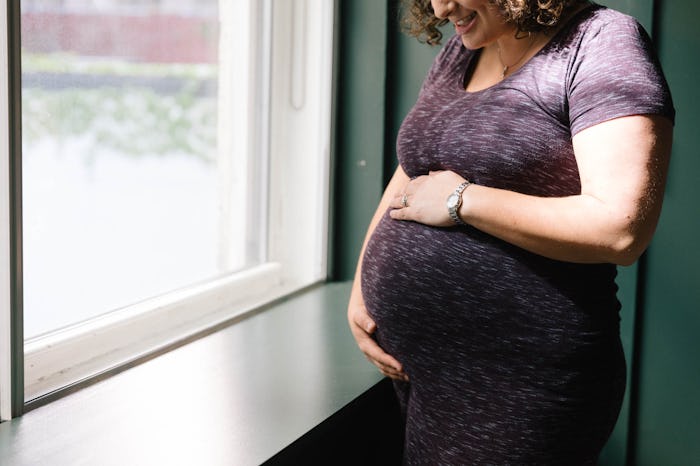Life
Braxton Hicks Make Your Belly Rock Hard, But Here's How *Real* Contractions Will Feel
Contractions are such a weird sensation when you first start feeling them. I remember my first contraction took me totally by surprise. I could not for the life of me figure out what my abdomen was doing. It looked like it had frozen solid and while it was uncomfortable, it didn't hurt. At least not at first. It was also tight, almost hard to the touch, harder than it was normally, which as any pregnant woman will tell you, is saying something. But are true labor contractions different from Braxton Hicks? Do real contractions make your stomach hard? Or at least, harder than normal?
Both Braxton Hicks contractions and the contractions that arrive in the true course of labor tighten and firm the abdomen, according to researchers at the University of Buffalo. That's one of the things that can sometimes make it very difficult to discern the difference between the false labor contractions of Braxton Hicks and the honest-to-goodness contractions of real labor. According to the American College of Obstetricians and Gynecologists (ACOG), the main difference is in intensity and how painful they are, regularity in timing and duration, and progression in regards to what is happening in your cervix. Progression is only able to be absolutely evaluated by a medical provider.
Honestly, the feel of my abdomen was no different between a false contraction and a real one, and I had so many Braxton Hicks during the course of my last pregnancy that I eventually started to almost ignore them. Unless I was having a panic attack over them, that is. It was really hot or cold for my emotional state during those long months. This is just what happens when someone with OCD gets pregnant. My stomach was like an overfilled water balloon that felt as though it was nearing on bursting every time I had any kind of contraction. It was truly hard to the touch to the point where it freaked my husband out.
But do real contractions make your stomach harder than false labor contractions? I spoke to labor and delivery nurse Rebecca Tsu and she tells Romper, "All contractions are going to make your stomach feel firmer to the touch than it is usually," but that real contractions will have the ability to do it for longer periods of time, so while it might not feel any harder on the outside, "they will be harder to endure."
Tsu says that functionally, "real contractions are stronger, and they're doing more work." Braxton Hicks are like practice — they're getting your body ready to experience labor, and getting it ready to do the work. They're the warm-up jog before the marathon. "If you notice them happening more than usual, or they hurt, call your OB," Tsu advises, because while they are usually nothing to worry about, it's easy to mistake early labor with false labor, and that's especially dangerous when you're earlier in your pregnancy.
She also adds that it's important to keep a line of communication open with your provider so that they're aware of the pattern and habits of your Braxton Hicks, and they can help you determine whether or not you're in actual labor and things are progressing. All contractions will make your stomach hard or firm, but only real contractions move things forward and begin the process of labor that leads to your cervix softening and dilating, and the baby moving down into the birth canal.
It's annoying, and it's more than a little alien to feel your stomach get hard, but it's also just a part of having a baby. If you're worried, talk to your doctor — they can get you settled. Otherwise, a hard belly is a great place to rest your popcorn while you watch Game of Thrones.
